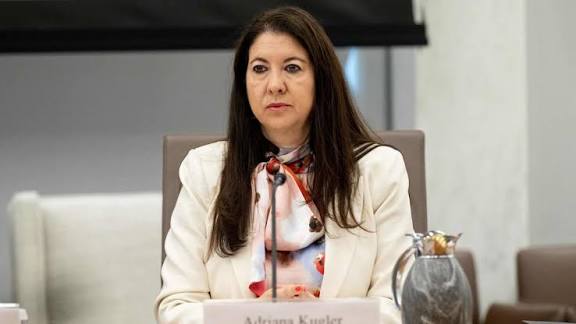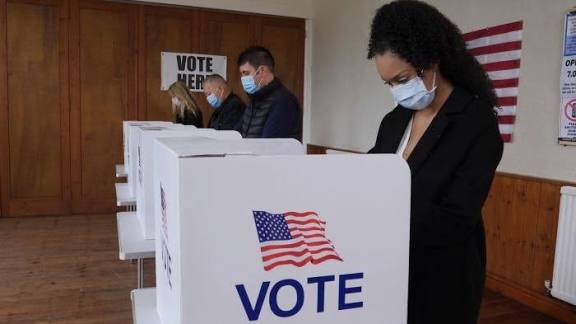Adriana kugler resignation: Improper Stock Trades,Who appointed,Who replaced

Former Fed Governor Adriana Kugler resigns… Kugler resigns from Fed board after revelations of improper stock trades. Today we will discuss about Adriana kugler resignation: Improper Stock Trades,Who appointed,Who replaced
Adriana kugler resignation: Improper Stock Trades,Who appointed,Who replaced
The resignation of Federal Reserve Governor Adriana D. Kugler in August 2025 has become one of the most talked-about events in U.S. financial and political circles. Her early exit—months before her term was set to expire—sparked intense speculation regarding ethics violations, internal Federal Reserve dynamics, and the shifting political landscape under the Trump administration. Central to the conversation are allegations of improper stock trades, questions about the transparency of her personal records, and debates over who would fill her influential seat on the Federal Reserve Board.
This comprehensive article explores her background, the stock-trading controversy, her resignation circumstances, who appointed her, and who ultimately replaced her.
Who Is Adriana Kugler?

Adriana Kugler is a widely respected economist known for her work in labor markets, public policy, and international economics. Before joining the Federal Reserve Board, she built a distinguished career in academia and government service.
Professional Background
Academic Career: Kugler served as a professor at Georgetown University’s McCourt School of Public Policy. Her research focused on employment, workforce development, and economic inequality.
Government Roles: She previously worked as the U.S. Executive Director at the World Bank and as the Chief Economist at the U.S. Department of Labor.
Historic Achievement: She became the first Hispanic to serve as a Governor on the Federal Reserve Board, marking an important milestone in the institution’s history.
Appointment to the Federal Reserve
President Joe Biden nominated Kugler to the Federal Reserve Board of Governors in 2023, and she was confirmed by the Senate the same year. She was seen as a highly qualified pick with expertise relevant to labor markets, international finance, and employment policy—key aspects of the Fed’s mandate.
Her term was scheduled to run until January 31, 2026, but she stepped down in August 2025.
Improper Stock Trades: The Central Controversy
A major reason Adriana Kugler’s resignation drew widespread attention was the emergence of allegations surrounding improper stock trades. These controversies came to light through filings, disclosures, and investigative reporting in the months following her resignation.
Key Points About the Stock-Trading Violations
Multiple Improper Trades: Financial disclosures revealed several questionable stock trades executed in 2024. These transactions included well-known companies such as Apple, Caterpillar, Southwest Airlines, and others.
Blackout Period Violations: Some trades occurred during Federal Reserve blackout periods, times when Fed officials are prohibited from trading individual securities because of their insider access to economic policy decisions.
Involvement of Her Husband: Kugler stated that many of the trades were made by her spouse, without her knowledge, and were not coordinated with her.
Fed Ethics Compliance Issues: The Federal Reserve declined to certify that she fully complied with ethics rules. The matter was referred to the Office of the Inspector General, signaling the seriousness of the violation.
Repeat Violations: Earlier in 2024, Kugler had already disclosed several unintentional violations, calling them inadvertent errors. However, the repeated nature of these issues raised concerns within the Fed about oversight and compliance.
Legal Assistance: Reports indicated that she accepted more than $40,000 in pro bono legal services to navigate these challenges. While allowed, it added another layer of scrutiny.
Denied Waiver Request: Kugler reportedly asked for a waiver to participate in a key Federal Reserve meeting despite her violations, but the request was denied.
The Bigger Problem
The Federal Reserve has previously dealt with misconduct involving stock trading among high-level officials. Kugler’s violations, coming after that renewed focus on ethics, reignited debate on how strongly the institution enforces its policies and how transparent it should be about violations.
Why Adriana Kugler Resigned
Although her resignation letter did not mention the stock-trading controversy, the timing and context strongly suggest that the ethics issues played a significant role.
Stated Reason: Return to Academia
In public communication, Kugler stated that she was resigning to return to her role as a professor at Georgetown University. She described her time at the Fed as “an honor of a lifetime” and made no mention of the ongoing ethics investigations.
More Context Behind the Exit
Several factors point to deeper motivations:
Growing Ethics Scrutiny: The violations related to stock trading became difficult to ignore. The Inspector General’s involvement likely intensified pressure to step aside.
Political Landscape: Her resignation gave President Donald Trump an unexpected opening to appoint a new member to the Federal Reserve Board. Given Trump’s strong views on monetary policy and criticisms of the Fed, this opportunity carried significant strategic weight.
Real Estate Filing Issues: Investigations revealed conflicting information in her Maryland property tax records involving her primary residence. Although she attributed this to clerical errors by local officials, it added another layer of controversy at a sensitive time.
Internal Fed Pressure: Reports indicated that internal confidence in her leadership had weakened, particularly after the disclosure of multiple ethics violations.
Her resignation, therefore, appears to be the outcome of combined ethical, political, and personal factors—even if the official statements framed it as an academic transition.
Who Appointed Adriana Kugler — and Why It Mattered
Kugler’s appointment was part of President Biden’s broader strategy to reshape the Federal Reserve Board with leaders who represented diversity and brought expertise in labor economics and workforce development. Biden’s picks generally favored academic backgrounds, practical policymaking experience, and a focus on labor market equity.
Her presence on the Board symbolized:
A commitment to diversity in senior economic positions
A balanced approach to monetary policy
A deeper understanding of employment, wage growth, and job market dynamics
Her departure under the Trump administration created a dramatic shift, allowing a president with sharply different monetary priorities to fill her seat.
Who Replaced Her After Resignation?
After Kugler announced her resignation, President Trump moved quickly to nominate a successor.
Stephen Miran: The Chosen Successor
President Trump selected Stephen Miran, an economist and senior government advisor, to fill the seat vacated by Kugler.
Background of Stephen Miran
Served as Chair of the Council of Economic Advisers
Previously worked at the U.S. Department of the Treasury
Well-known for advocating policies aligned with Trump’s economic philosophy
Emphasizes deregulation, lower taxes, and a more conservative approach to monetary policy
Nature of Miran’s Appointment
Miran was nominated to serve only the remainder of Kugler’s term, which was set to end on January 31, 2026. This made his appointment temporary, but very consequential. Even a short-term Fed governor can:
Influence interest rate decisions
Vote on monetary policy
Help shape the Fed’s internal debates
Set the tone during a politically charged transition period
Political Implications
With Miran’s appointment, Trump gained an immediate opportunity to steer the Federal Reserve in a direction more aligned with his economic goals. Analysts viewed this as a strategic move that could influence interest rates, inflation management, and even future leadership at the Fed.
Wider Implications of Kugler’s Resignation
Kugler’s departure goes far beyond an individual stepping down from a key economic role. It carries implications for:
1. Federal Reserve Independence
Critics argue that sudden vacancies enabling politically motivated appointments risk undermining the Fed’s political neutrality.
2. Ethical Standards at the Fed
With repeated ethics concerns among Fed officials in recent years, her case highlights lingering weaknesses in internal oversight and transparency.
3. Financial Market Sentiment
Markets tend to react to high-level changes at the Fed due to uncertainty regarding:
Interest rates
Inflation policy
Regulatory environment
Stability of financial markets
4. Policy Direction
Miran’s policy stance contrasts significantly with Kugler’s. Her departure and replacement signaled a potential rightward shift in the Fed’s approach.
Conclusion
Adriana Kugler’s resignation from the Federal Reserve Board is a case study in how ethics, politics, and public policy can collide at the highest levels of financial governance. While her official explanation emphasized a return to academia, the backdrop of improper stock trades, internal Fed concerns, and political transitions paints a more complex picture.
Her early exit opened a critical opportunity for the Trump administration, reshaping the Federal Reserve at a time when monetary policy was already under intense scrutiny. With Stephen Miran stepping into the role, even temporarily, the direction and independence of the central bank became part of a broader national conversation.
How useful was this post?
Click on a star to rate it!
Average rating 0 / 5. Vote count: 0
No votes so far! Be the first to rate this post.
About the Author
usa5911.com
Administrator
Hi, I’m Gurdeep Singh, a professional content writer from India with over 3 years of experience in the field. I specialize in covering U.S. politics, delivering timely and engaging content tailored specifically for an American audience. Along with my dedicated team, we track and report on all the latest political trends, news, and in-depth analysis shaping the United States today. Our goal is to provide clear, factual, and compelling content that keeps readers informed and engaged with the ever-changing political landscape.




